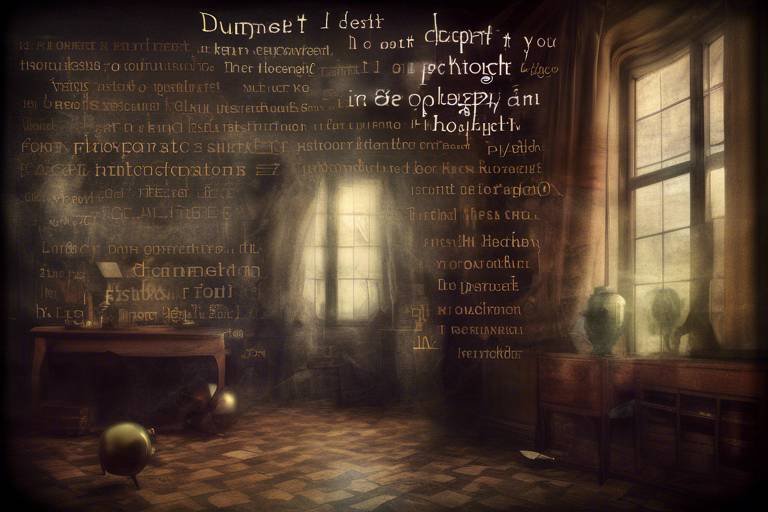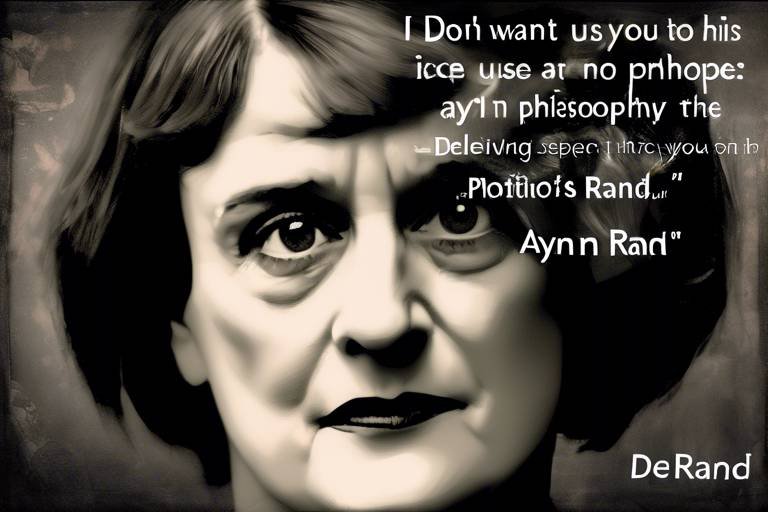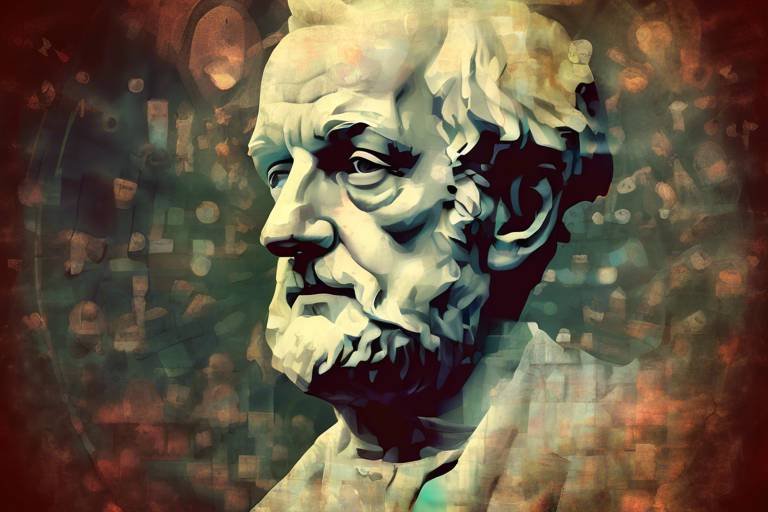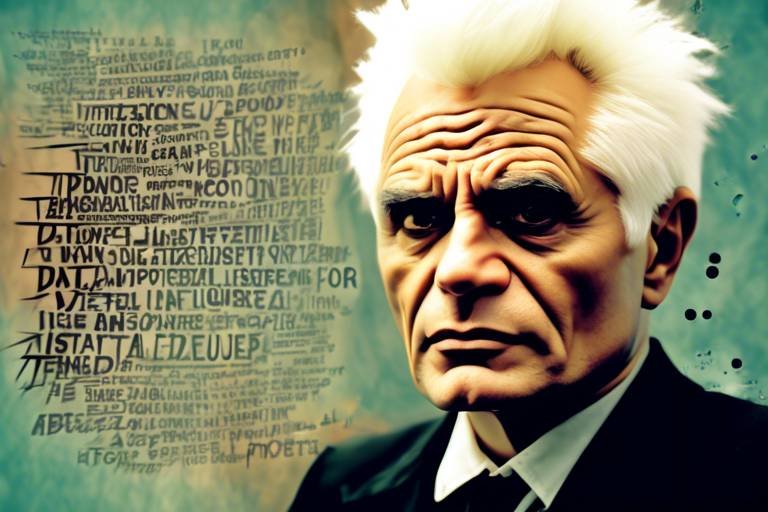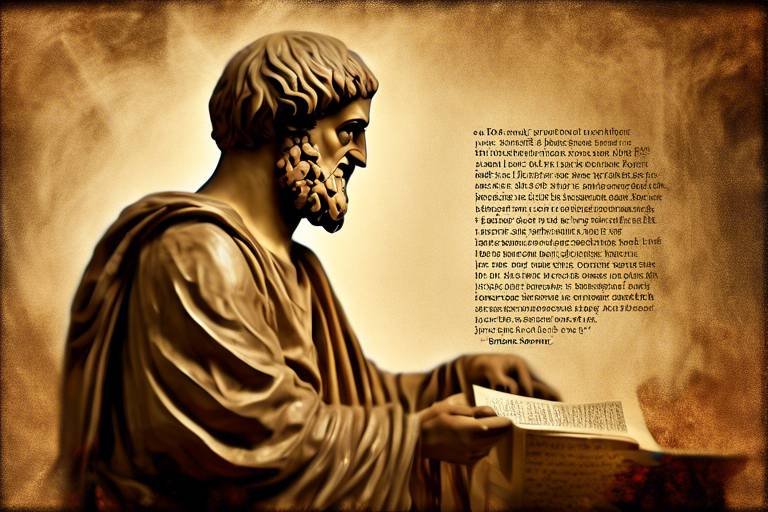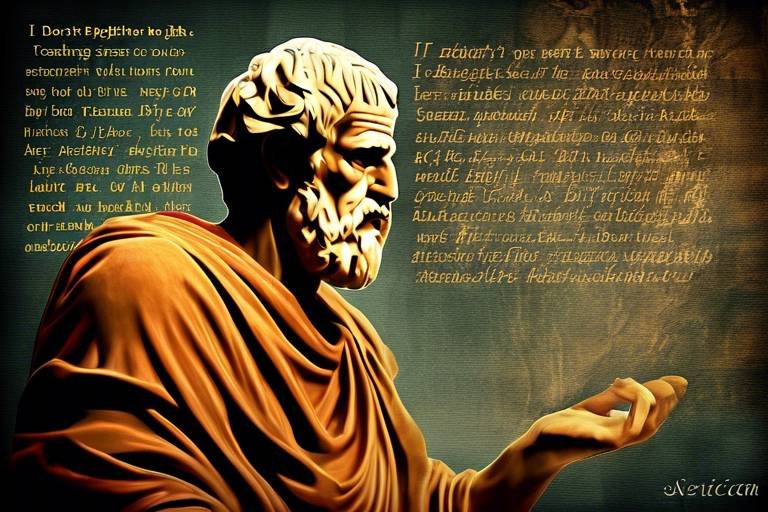Wilhelm Dilthey's Contribution to Hermeneutics - An Overview
Wilhelm Dilthey, a prominent German philosopher of the late 19th and early 20th centuries, made profound contributions to the field of hermeneutics, which is the art and science of interpretation. His work is pivotal in understanding how we interpret texts, actions, and social phenomena. Dilthey's insights opened new avenues for exploring the human experience, emphasizing the importance of context and meaning in our interactions with the world around us.
At the heart of Dilthey's philosophy lies the idea that human sciences, or the Geisteswissenschaften, differ fundamentally from the natural sciences. While natural sciences seek to explain phenomena through objective observation and measurement, Dilthey argued that human sciences require a different approach—one that focuses on understanding the subjective experiences and meanings that individuals attach to their lives. This distinction is crucial as it lays the groundwork for a hermeneutic methodology that prioritizes interpretation over mere explanation.
To grasp the significance of Dilthey's contributions, it's essential to consider the historical context in which he worked. The late 19th century was a time of great intellectual upheaval, marked by rapid advancements in science and a growing interest in psychology, sociology, and philosophy. Dilthey's theories emerged as a response to these changes, aiming to reconcile the rigor of scientific inquiry with the complexities of human experience. He believed that understanding human behavior requires an appreciation of the historical and cultural contexts that shape individual lives.
In this article, we will delve deeper into the key philosophical concepts introduced by Dilthey, exploring his ideas on Verstehen (understanding) and the importance of historical context in interpretation. We will also examine how his work has influenced contemporary hermeneutics, addressing both the accolades and critiques that have arisen in response to his theories. Through this exploration, we hope to illuminate the rich tapestry of Dilthey's thought and its enduring impact on the study of human sciences.
- What is hermeneutics? Hermeneutics is the theory and methodology of interpretation, especially the interpretation of texts, language, and symbolic expressions.
- How did Dilthey differentiate between natural and human sciences? Dilthey emphasized that natural sciences focus on objective explanations, while human sciences require an understanding of subjective experiences and meanings.
- What is Verstehen? Verstehen is a German term that translates to "understanding." In Dilthey's context, it refers to the interpretive process necessary for grasping the meanings behind human actions and social phenomena.
- What are some critiques of Dilthey's approach? Critics argue that his focus on individual experience may overlook broader social structures and contexts that influence human behavior.
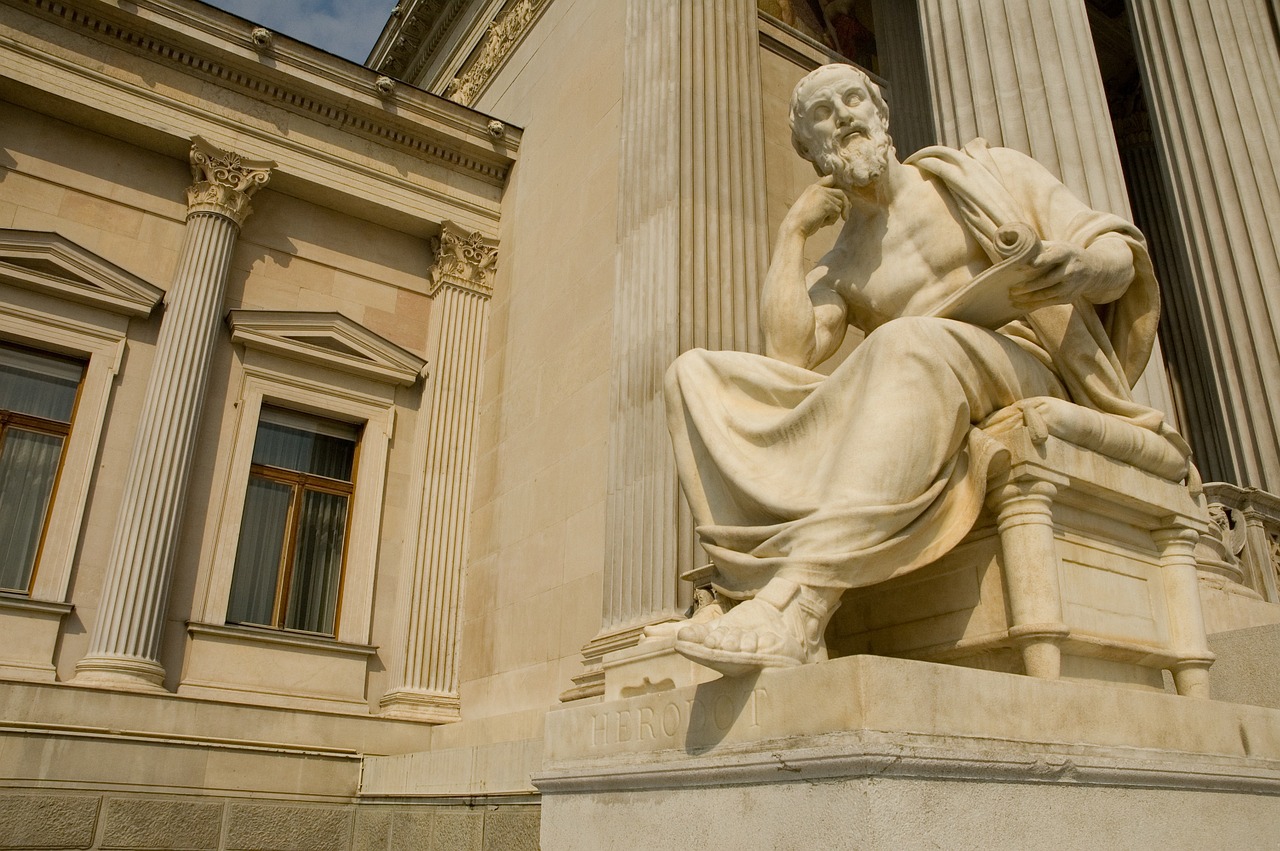
Historical Context of Dilthey's Work
To fully appreciate Wilhelm Dilthey's contributions to hermeneutics, it's essential to consider the historical context in which he was writing. The late 19th century was a period of profound change and intellectual upheaval in Europe. The aftermath of the Industrial Revolution was reshaping societies, not just economically but also culturally and philosophically. Think about it: cities were growing, traditional ways of life were being challenged, and new scientific discoveries were emerging at a rapid pace. This was a time when the boundaries of knowledge were being pushed, and the very nature of what it meant to understand human experience was being redefined.
During this era, the philosophical landscape was dominated by movements such as positivism and empiricism, which emphasized observable phenomena and scientific methodologies. However, Dilthey sought to carve out a niche for the human sciences, arguing that the methods used in natural sciences were inadequate for understanding the complexities of human life. He believed that human experiences are not merely data points to be analyzed but are rich, textured narratives that require a different approach—one rooted in interpretation.
Moreover, the Romantic movement was also influential during this time, emphasizing individual experience, emotion, and the subjective nature of reality. Dilthey was deeply affected by these ideas, as they resonated with his belief in the importance of lived experience as a source of knowledge. He viewed understanding human behavior and social phenomena as a process that goes beyond mere observation; it requires empathy and an appreciation of context.
In addition, the rise of historical consciousness in the 19th century played a crucial role in shaping Dilthey's thought. The emphasis on understanding history not just as a series of events but as a complex interplay of ideas and experiences informed his approach to hermeneutics. He argued that to truly understand a text or a social phenomenon, one must consider the historical circumstances that shaped it. This perspective positioned him in contrast to his contemporaries who often favored more abstract, universal principles.
In summary, the historical context of Dilthey's work is characterized by a clash between scientific rationalism and the growing recognition of the importance of human experience and historical context. This backdrop not only influenced his philosophical development but also laid the groundwork for his pioneering contributions to hermeneutics, which continue to resonate in contemporary discussions about the nature of understanding and interpretation.

Key Philosophical Concepts
Wilhelm Dilthey's contributions to hermeneutics are deeply rooted in his exploration of several key philosophical concepts that fundamentally shaped the way we understand human experience. One of the most significant ideas he introduced is the notion of understanding, which he believed is essential for interpreting human behavior and social phenomena. Unlike the natural sciences, which rely heavily on empirical data and objective analysis, Dilthey argued that the human sciences require a different approach—one that embraces the subjective experiences of individuals. This distinction is critical as it highlights the unique nature of human sciences, where the meanings and interpretations of actions are paramount.
At the heart of Dilthey's philosophy is the concept of lived experience. He posited that to truly understand another person, one must consider their unique context, emotions, and experiences. This idea resonates with the idea that human beings are not merely data points to be analyzed but rather complex individuals shaped by their histories and environments. Dilthey's emphasis on lived experience invites us to engage with others on a more profound level, fostering empathy and deeper connections.
Another pivotal concept introduced by Dilthey is Verstehen, which translates to "understanding" in German. This concept is not just about grasping the surface meanings of actions but involves a deeper, more empathetic engagement with the intentions and emotions behind those actions. Dilthey believed that Verstehen is essential for interpreting texts, social actions, and cultural artifacts. It allows us to move beyond mere observation to a richer comprehension of the human experience.
Verstehen serves as a bridge between the subjective and objective realms of knowledge. Dilthey argued that the human sciences must employ Verstehen to uncover the meanings behind human behavior, which cannot be fully explained through statistical data alone. For instance, consider how two people may react differently to the same event—one might feel joy, while the other experiences sorrow. Understanding these varied emotional responses requires a nuanced approach, one that Verstehen provides.
In his work, Dilthey made a crucial distinction between interpretation and explanation. While explanation seeks to uncover causal relationships, often found in the natural sciences, interpretation aims to reveal the meanings embedded within human actions and cultural expressions. This distinction is vital for researchers and scholars in the human sciences, as it shapes their methodologies and approaches. For example, when studying a piece of literature, an explanation might focus on the author's background and historical context, whereas interpretation delves into the themes, symbols, and emotional undertones that resonate with readers.
Historical context plays a vital role in Dilthey's hermeneutics. He believed that understanding the historical background of a text or action enriches the interpretive process significantly. By situating an event or a piece of literature within its historical framework, scholars can uncover deeper meanings that would otherwise remain hidden. For instance, the significance of a political speech can change dramatically when viewed through the lens of the socio-political climate in which it was delivered.
To illustrate this point, consider the following table that showcases how different historical contexts can alter the interpretation of a single event:
| Event | Context A (e.g., 1960s Civil Rights Movement) | Context B (e.g., 1980s Economic Reforms) |
|---|---|---|
| Protest March | Struggle for racial equality, social justice, and civil rights. | Focus on economic liberalization and privatization of state-owned enterprises. |
As seen in the table, the same event can carry vastly different meanings depending on the historical context in which it is interpreted. This underscores the importance of Dilthey's approach to hermeneutics, where understanding is not just about the text or action itself but also about the broader historical landscape that informs it.
In summary, Wilhelm Dilthey's key philosophical concepts form the bedrock of his hermeneutic methodology. His focus on understanding, lived experience, Verstehen, and the interplay of interpretation and explanation provides a comprehensive framework for exploring the complexities of human behavior and social phenomena. By emphasizing the significance of historical context, Dilthey invites us to engage with the richness of human experience, making his contributions to hermeneutics both profound and enduring.

The Concept of Verstehen
Wilhelm Dilthey's notion of Verstehen, which translates to "understanding," is a cornerstone of his hermeneutic philosophy. At its core, Verstehen emphasizes the importance of grasping the meaning behind human actions and experiences, rather than merely observing them as an outsider. Imagine watching a movie without understanding the characters' motivations; you might see the events unfold, but the emotional depth would be lost. This is where Dilthey's concept shines, inviting us to delve deeper into the human experience.
What makes Verstehen particularly fascinating is its contrast with the methodologies employed in the natural sciences. While natural sciences often rely on explanation—seeking to uncover universal laws through observation and experimentation—Dilthey argued that the human sciences require a different approach. He believed that understanding human behavior necessitates an interpretative framework, one that acknowledges the subjective nature of human experience. In this sense, Verstehen acts as a bridge, connecting the inner world of individuals with the external realities they inhabit.
To illustrate this idea further, consider the following key aspects of Verstehen:
- Empathy: Engaging with others' emotions and experiences is crucial. It’s about stepping into someone else's shoes and feeling their journey.
- Contextual Awareness: Understanding is deeply rooted in the historical and cultural contexts that shape individuals. Just like a book cannot be appreciated without knowing its background, human actions cannot be fully grasped without acknowledging their contexts.
- Interpretation: This involves analyzing the meanings behind actions, which can vary significantly based on individual perspectives and societal norms.
In essence, Verstehen is not just about knowing what people do; it's about understanding why they do it. This depth of understanding is what sets human sciences apart from the natural sciences. Dilthey’s emphasis on Verstehen encourages us to recognize that human behavior is often influenced by complex emotional and social factors, making it essential for scholars and practitioners alike to adopt an interpretative approach when studying human phenomena.
Moreover, Dilthey’s work on Verstehen has had profound implications for fields such as psychology, sociology, and anthropology. By prioritizing understanding over mere explanation, researchers can uncover the rich tapestry of human life, leading to more nuanced interpretations and insights. This shift in perspective allows us to appreciate the complexity of human existence, moving beyond surface-level observations to engage with the deeper meanings that define our experiences.
In conclusion, Wilhelm Dilthey’s concept of Verstehen is a vital contribution to hermeneutics, emphasizing the significance of understanding in the human sciences. It challenges us to look beyond the observable and to engage with the rich, subjective experiences that shape our lives. As we continue to explore human behavior, embracing the principles of Verstehen can lead to a more profound appreciation of the intricacies of the human condition.

Interpretation vs. Explanation
When diving into the rich waters of hermeneutics, one cannot overlook the pivotal distinction that Wilhelm Dilthey made between interpretation and explanation. At first glance, these terms might seem interchangeable, but in the realm of human sciences, they represent two fundamentally different approaches to understanding human behavior and social phenomena. Interpretation is more than just deciphering a text or a behavior; it’s about grasping the meaning behind actions, emotions, and cultural expressions. In contrast, explanation leans heavily on the methodologies of the natural sciences, focusing on causation and objective analysis.
To put it simply, when we interpret, we are attempting to enter the world of the individual, to understand their lived experiences and the context in which they exist. Imagine trying to understand a painting. Interpretation would involve delving into the artist's intentions, the emotions conveyed, and the cultural backdrop that influenced the work. On the other hand, explanation would focus on the materials used, the techniques applied, and the historical movements that shaped the artist's choices. This distinction is crucial because it highlights how human experiences can be rich and complex, often defying simple cause-and-effect explanations.
In Dilthey’s view, the human sciences must prioritize interpretation to truly understand the subjective experiences of individuals. By emphasizing this distinction, he encourages researchers to embrace a more holistic approach to human behavior. This is especially relevant when considering how we study social phenomena. For instance, if we look at a community's response to a crisis, an explanatory approach might focus on statistical data and observable outcomes, while an interpretive approach would seek to understand the emotional and cultural narratives that shape that community's reaction.
Moreover, Dilthey's framework invites us to consider the historical context in which individuals operate. Interpretation requires an understanding of the time and place that informs a person's actions, beliefs, and values. This layered understanding adds depth to our analyses and allows for a more nuanced appreciation of human behavior. In this way, Dilthey's insights pave the way for a richer dialogue between the individual and the collective, urging us to consider not just what people do, but why they do it.
In conclusion, the contrast between interpretation and explanation is not merely academic; it has profound implications for how we approach the study of human behavior. By prioritizing interpretation, we open ourselves up to a world of meaning that is often overlooked in more traditional scientific approaches. This understanding not only enriches our insights into human experience but also fosters empathy and connection in our interactions with others.

The Role of Historical Context
When we dive into the world of hermeneutics, particularly through the lens of Wilhelm Dilthey, we quickly discover that historical context is not just an accessory—it’s a fundamental element of understanding human experience. Imagine trying to read a novel without knowing the time period it was written in; the characters' motivations and actions might seem baffling. Similarly, Dilthey argued that to truly grasp the meaning of any human action or expression, one must consider the historical backdrop against which it occurs.
For Dilthey, the past is not merely a collection of events; it is a living context that shapes our interpretations. He believed that every action is embedded within a specific historical framework, which provides the necessary clues for interpretation. This perspective is crucial because it acknowledges that our understanding is inherently influenced by the time and culture in which we live. Just as a fish cannot see the water around it, we often take for granted the historical conditions that inform our thoughts and behaviors.
To illustrate this point, let’s consider a few key aspects of how historical context plays a role in interpretation:
- Temporal Factors: The era in which an event occurs can drastically change its meaning. For instance, the significance of a political movement in the 1960s may differ greatly from how we perceive it today.
- Cultural Influences: Different cultures interpret actions and texts in various ways. Understanding the cultural background can unlock new dimensions of meaning.
- Social Structures: The societal norms and structures of a given time can shape individual actions. Recognizing these structures allows for a deeper understanding of motivations.
By emphasizing the importance of historical context, Dilthey opened up a dialogue about the dynamic relationship between past and present. He encouraged scholars and thinkers to approach human sciences with a sense of humility and awareness, recognizing that our interpretations are always situated within a broader historical narrative. This approach not only enriches our understanding but also challenges us to reflect on how our current context might influence our interpretations of the past.
In essence, Dilthey's insistence on the role of historical context serves as a reminder that interpretation is an active process, one that requires us to engage with the complexities of human experience. Just as an artist draws inspiration from their surroundings, our understanding of human actions must be informed by the rich tapestry of history. This perspective not only enhances our grasp of hermeneutics but also invites us to consider the implications of our interpretations in light of the ever-evolving historical landscape.

Influence on Contemporary Hermeneutics
Wilhelm Dilthey's impact on the field of hermeneutics is nothing short of revolutionary. His ideas have not only shaped the foundations of hermeneutic theory but have also paved the way for a myriad of interpretations and applications in contemporary thought. To grasp the full scope of his influence, one must delve into how his concepts have been embraced and adapted by modern philosophers, social scientists, and scholars across various disciplines.
One of the most significant aspects of Dilthey's legacy is his emphasis on understanding human experience through a subjective lens. This notion resonates deeply in contemporary hermeneutics, where the focus is often on the interpretation of texts, actions, and social practices within their specific contexts. Modern scholars have taken Dilthey's idea of Verstehen (understanding) and expanded it, applying it to a range of fields including psychology, sociology, and literary theory. They argue that to fully grasp the meaning behind human behavior, one must consider the lived experiences and historical contexts that shape individuals.
Moreover, Dilthey's distinction between interpretation and explanation continues to be a pivotal point of discussion. His assertion that the human sciences require a different methodological approach compared to the natural sciences has led to a deeper exploration of qualitative research methods. Today, scholars are increasingly recognizing the importance of narrative and context in understanding human actions, moving away from purely quantitative analyses. This shift has resulted in a more holistic view of human behavior, where the meaning-making processes are foregrounded.
Additionally, Dilthey's focus on historical context has influenced contemporary hermeneutics significantly. Modern interpreters stress that understanding any text or action requires a thorough grasp of the historical and cultural backdrop in which it was produced. This approach has led to the development of interdisciplinary studies that bridge history, literature, and philosophy, fostering a richer understanding of human expression. As a result, we see a growing trend in academia where historical context is not merely an add-on but a fundamental component of hermeneutic analysis.
To illustrate Dilthey's influence, consider the following table that highlights key thinkers who have built upon his ideas:
| Thinker | Contribution |
|---|---|
| Hans-Georg Gadamer | Emphasized the importance of dialogue and historical context in understanding texts. |
| Paul Ricoeur | Integrated narrative theory into hermeneutics, focusing on the interpretation of texts as a form of life. |
| Jürgen Habermas | Explored the role of communication and consensus in understanding social phenomena. |
In conclusion, Wilhelm Dilthey's contributions to hermeneutics have left an indelible mark on contemporary thought. His insistence on the importance of understanding human experience, the distinction between interpretation and explanation, and the significance of historical context have all shaped the trajectory of modern hermeneutic inquiry. As scholars continue to engage with his ideas, they find new ways to apply his insights, ensuring that his legacy endures in the ever-evolving landscape of the human sciences.
- What is hermeneutics? Hermeneutics is the study of interpretation, particularly of texts and symbolic expressions.
- How did Dilthey influence hermeneutics? Dilthey emphasized understanding human experience and the importance of historical context, shaping modern interpretations of human behavior.
- What is Verstehen? Verstehen is a German term meaning "understanding," which Dilthey used to highlight the subjective nature of human sciences.
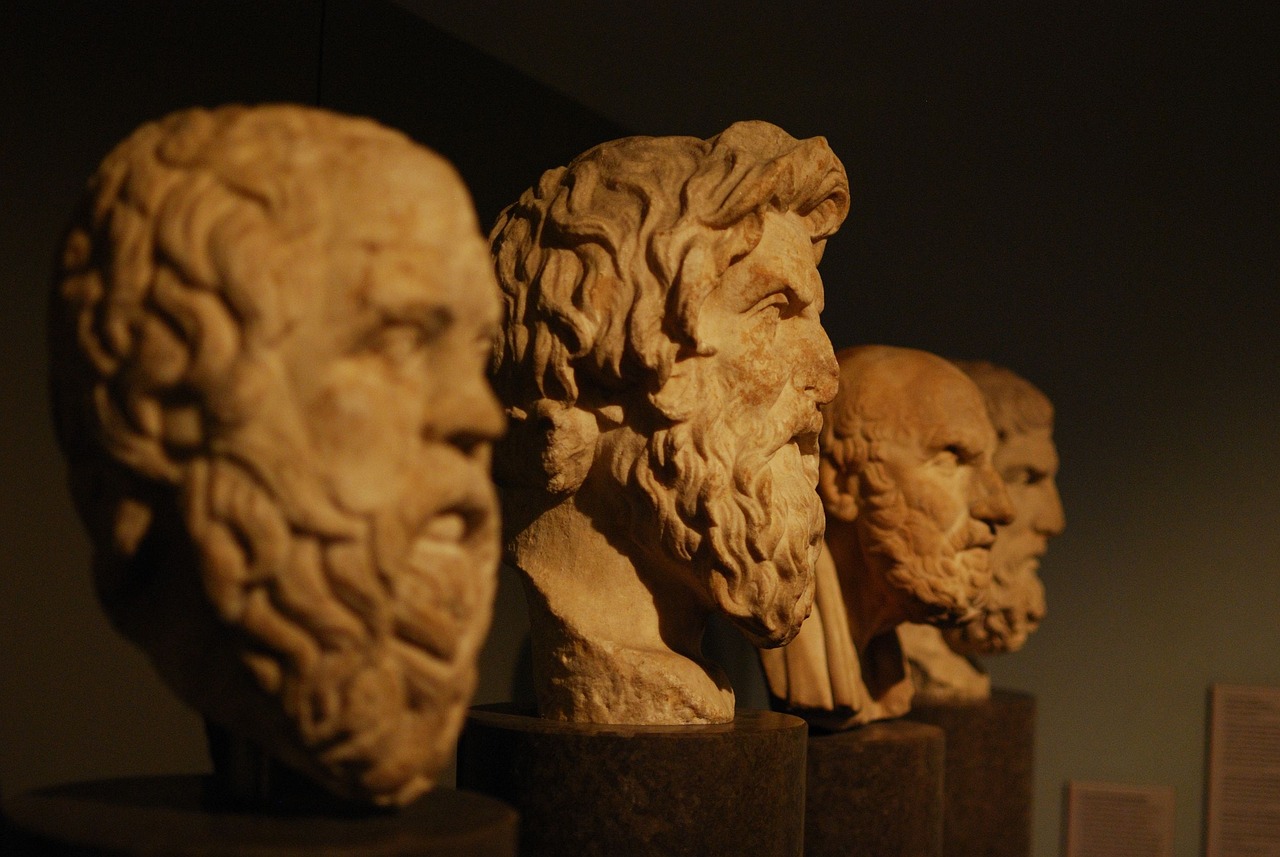
Critiques of Dilthey's Approach
While Wilhelm Dilthey's contributions to hermeneutics are widely acknowledged and celebrated, they are not without their share of critiques. Scholars and philosophers have raised various concerns regarding the limitations and implications of his methodologies. One significant critique is centered around the scope of his focus on individual experience. Critics argue that by emphasizing personal lived experiences, Dilthey may inadvertently overlook the broader social structures that shape human understanding and behavior. This focus can lead to a somewhat narrow interpretation of human sciences, reducing the complexity of societal influences to mere individual narratives.
Moreover, some argue that Dilthey's distinction between the natural sciences and human sciences, while innovative, creates an artificial divide that may hinder a more integrated approach to understanding human phenomena. For instance, the methodologies employed in the natural sciences—such as quantitative analysis and empirical observation—are often dismissed in favor of qualitative interpretations. This dismissal may limit the potential for a more holistic understanding of human behavior, which could benefit from a synthesis of both approaches.
Another area of critique revolves around Dilthey's concept of Verstehen, or understanding. While this concept is pivotal to his hermeneutics, some scholars question whether it can be universally applied across different contexts and cultures. The reliance on subjective interpretation raises concerns about the potential for bias, as individual experiences can vary widely. This subjectivity might lead to interpretations that are more reflective of the interpreter's own perspectives rather than the intended meanings of the text or social phenomena being analyzed.
In addition to these critiques, there is also a discourse surrounding the relevance of Dilthey's work in contemporary hermeneutics. Some modern scholars argue that his ideas, while foundational, may not adequately address the complexities of today's globalized and interconnected world. As society evolves, new challenges emerge that require a more nuanced understanding of human behavior—one that considers the impact of technology, globalization, and cultural exchange. Critics suggest that Dilthey's framework may need to be adapted or expanded to remain relevant in addressing these contemporary issues.
Nevertheless, it's essential to recognize that critiques of Dilthey's approach do not diminish the significance of his contributions. Instead, they invite a thoughtful dialogue about the evolution of hermeneutics and the ongoing relevance of his ideas. In response to these critiques, many defenders of Dilthey's work argue that his emphasis on historical context and lived experience is more critical than ever, especially in an age where understanding diverse perspectives is crucial for social cohesion and empathy.
In summary, while Wilhelm Dilthey's approach to hermeneutics has faced various critiques, these discussions serve to enrich the field rather than undermine it. By exploring the limitations and implications of his methodologies, scholars can better appreciate the complexities of human understanding and continue to evolve hermeneutic theory in meaningful ways.
- What is hermeneutics? Hermeneutics is the study of interpretation, particularly the interpretation of texts, language, and symbolic expressions in human sciences.
- Why is Dilthey important in hermeneutics? Wilhelm Dilthey's work laid the foundation for modern hermeneutics by emphasizing the importance of understanding human experiences and historical context.
- What are the main critiques of Dilthey's approach? Critics argue that his focus on individual experiences may overlook broader social structures and that his methodologies may not fully address contemporary complexities.
- How can Dilthey's theories be applied today? Dilthey's emphasis on understanding and historical context remains relevant, encouraging scholars to consider diverse perspectives in their analyses.

Limitations in Scope
Despite the profound impact of Wilhelm Dilthey's contributions to hermeneutics, his work is not without its limitations. One of the primary critiques revolves around his emphasis on individual lived experiences, which some scholars argue may lead to an inadequate understanding of broader societal structures. When Dilthey focused on the subjective interpretations of individuals, he may have inadvertently sidelined the influence of collective social dynamics, power relations, and cultural contexts that shape human behavior. This focus on the individual can be likened to viewing a single tree in a forest without acknowledging the ecosystem surrounding it. While the tree is significant, understanding its role within the larger environment is crucial for a holistic perspective.
Furthermore, critics highlight that Dilthey’s approach tends to lean heavily on the notion of Verstehen (understanding) at the expense of Erklären (explanation). This preference raises questions about the objectivity of interpretations derived solely from personal experiences. For instance, when interpreting historical events, an individual’s perspective may be influenced by their unique background, emotions, and biases. Such subjectivity can lead to varied interpretations that, while valid in their own right, may not accurately reflect the complexities of the events being analyzed.
Additionally, the limitations of Dilthey's hermeneutics can be illustrated through a table that summarizes the main critiques:
| Critique | Description |
|---|---|
| Individual Focus | Overemphasis on personal lived experiences may overlook societal structures. |
| Subjectivity | Interpretations may be biased by individual backgrounds and emotions. |
| Lack of Objectivity | Difficulty in achieving a universally accepted understanding of phenomena. |
These limitations suggest that while Dilthey's framework offers valuable insights into human understanding, it may benefit from a more integrated approach that considers both individual experiences and the larger social contexts in which these experiences occur. By acknowledging these critiques, contemporary scholars can build upon Dilthey's foundation to develop a more comprehensive hermeneutic methodology that encompasses diverse perspectives and recognizes the intricate interplay between individual and societal factors.
- What is hermeneutics? Hermeneutics is the study of interpretation, especially the interpretation of texts, language, and symbolic expressions.
- How did Dilthey influence modern hermeneutics? Dilthey's emphasis on understanding lived experiences laid the groundwork for later thinkers to explore the complexities of human behavior and social phenomena.
- What are the main critiques of Dilthey's work? Critics argue that his focus on individual experience may overlook broader social structures and lead to subjective interpretations.

Responses to Critiques
In the face of various critiques aimed at Wilhelm Dilthey's hermeneutic methodology, defenders of his work have emerged with compelling arguments that underscore the continued relevance of his theories. One of the primary responses to the criticism regarding the scope of Dilthey's focus on individual experience is the assertion that such an emphasis does not negate the significance of broader social structures; rather, it complements them. By prioritizing personal lived experiences, Dilthey offered a lens through which to view the complexities of human behavior in a nuanced manner, allowing for a richer understanding of social phenomena.
Moreover, advocates of Dilthey argue that his insistence on the importance of Verstehen—the interpretative understanding of human actions—provides a robust framework for examining social contexts. This interpretative approach does not dismiss the existence of social structures; instead, it emphasizes how individuals navigate and interact with these structures based on their unique experiences. In this light, Dilthey’s work is seen as a bridge between individual agency and social determinism, illustrating that understanding human behavior requires a consideration of both personal and societal factors.
Furthermore, contemporary scholars have drawn parallels between Dilthey’s theories and modern developments in the social sciences. For instance, the rise of qualitative research methods in fields like sociology and anthropology echoes Dilthey’s insistence on the importance of context and interpretation. This methodological shift highlights how his ideas have not only persisted but have also been integrated into current academic discourse. By situating Dilthey within the broader landscape of social science research, proponents argue that his work remains vital for understanding the intricacies of human behavior.
In addition, some critics have pointed out that Dilthey’s emphasis on historical context may lead to an overly relativistic interpretation of human behavior. In response, defenders contend that understanding historical context does not equate to a denial of objective truths; rather, it enriches the interpretative process. They argue that acknowledging the influence of history on human actions allows for a more comprehensive analysis that respects the complexity of human life. This perspective is crucial in a world where cultural and historical narratives increasingly shape our understanding of identity and behavior.
Ultimately, the responses to critiques of Dilthey's work reveal a vibrant ongoing dialogue about the nature of human understanding. By addressing these criticisms head-on, defenders of Dilthey illustrate that his contributions to hermeneutics are not only foundational but also adaptable to contemporary issues in the social sciences. As we continue to explore the intricate web of human interactions, Dilthey’s insights serve as a valuable compass, guiding us through the multifaceted terrain of meaning-making and interpretation.
- What is Wilhelm Dilthey known for?
Wilhelm Dilthey is known for his contributions to hermeneutics, particularly his emphasis on understanding human experience through interpretation rather than mere explanation.
- How did Dilthey differentiate between natural and human sciences?
He distinguished them by highlighting that natural sciences focus on causal explanations, while human sciences emphasize interpretative understanding.
- What is Verstehen?
Verstehen is a German term meaning "understanding," which Dilthey considered crucial for interpreting human actions and social phenomena.
- Why is historical context important in Dilthey's philosophy?
Historical context is vital because it enriches the interpretation of human actions, allowing for a deeper understanding of the influences that shape individual experiences.
Frequently Asked Questions
- What is Wilhelm Dilthey's main contribution to hermeneutics?
Wilhelm Dilthey significantly shaped hermeneutics by introducing the concept of Verstehen, which emphasizes understanding human experiences and meanings rather than merely explaining them. His work highlighted the importance of lived experiences and the historical context in interpreting human behavior, distinguishing between the natural and human sciences.
- How does Dilthey differentiate between interpretation and explanation?
Dilthey argued that interpretation involves understanding the subjective meanings behind human actions, while explanation refers to the objective analysis typical of natural sciences. This distinction is crucial for studying human behavior, as it encourages a deeper engagement with individual experiences rather than reducing them to mere data points.
- Why is historical context important in Dilthey's hermeneutics?
According to Dilthey, understanding the historical context is vital for accurate interpretation. It enriches the hermeneutic process by providing insights into the circumstances that shape human experiences and meanings. This perspective allows for a more nuanced understanding of social phenomena and individual actions.
- What are some critiques of Dilthey's approach?
Critics argue that Dilthey's focus on individual lived experiences may overlook larger social structures and influences. This limitation raises questions about the comprehensiveness of his hermeneutic methodology, suggesting that it may not fully account for the complexities of human behavior within societal contexts.
- How have contemporary scholars responded to critiques of Dilthey?
Defenders of Dilthey contend that his emphasis on individual experience remains relevant, as it fosters a deeper understanding of human behavior. Contemporary scholars have sought to integrate his ideas with broader social theories, demonstrating that his work can still inform current discussions in hermeneutics and the human sciences.


